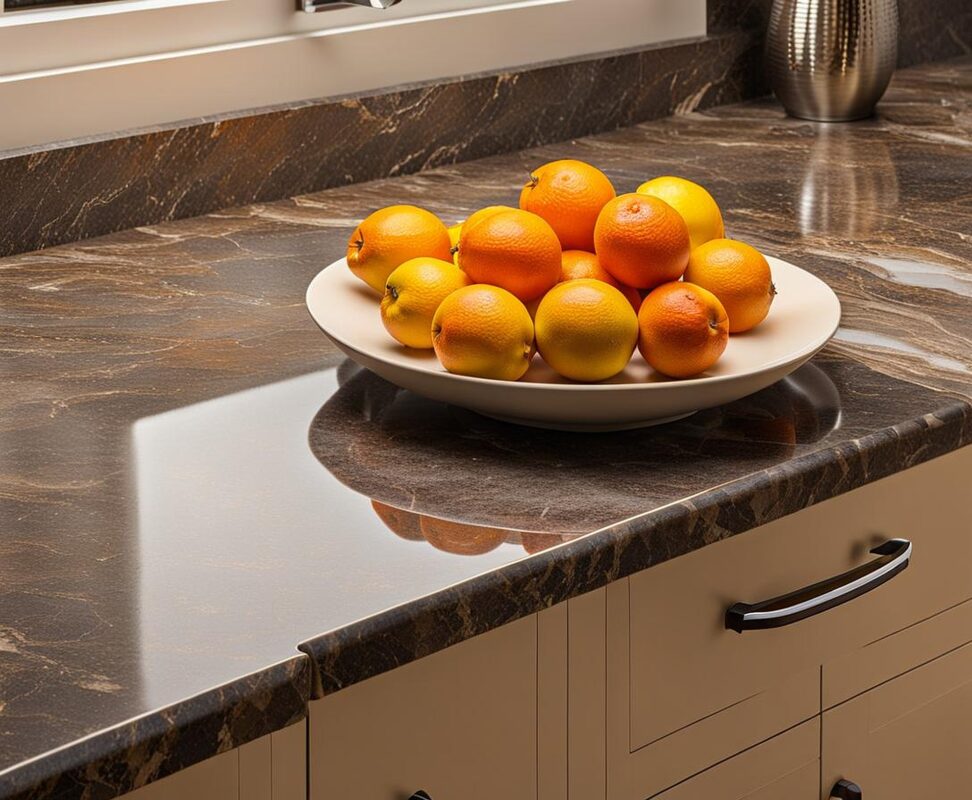Can Baking Soda Damage Granite Countertops? Experts Reveal
Granite countertops are a luxurious and durable addition to any kitchen or bathroom, but concerns arise when it comes to cleaning and maintaining them. One common household item that often sparks debates is baking soda – can it potentially damage these beautiful granite surfaces? Let’s delve into this topic and uncover the truth about using baking soda on granite countertops.
Understanding Granite and Its Properties
Before we explore the relationship between baking soda and granite, it’s crucial to understand the composition and characteristics of this natural stone. Granite is an igneous rock formed from the cooling and solidification of molten materials, primarily composed of quartz, feldspar, and various other minerals. Known for its exceptional hardness and durability, granite ranks between 6 and 7 on the Mohs hardness scale, making it a popular choice for countertops and other high-traffic surfaces.
However, despite its sturdy nature, granite is not entirely impervious to damage. Its porosity levels can vary depending on the specific type and quality of the stone. While some types of granite are highly dense and less porous, others may be more susceptible to staining, etching, or discoloration if not properly sealed and maintained.

Baking Soda: A Versatile Cleaning Agent
Baking soda, also known as sodium bicarbonate, is a gentle abrasive and alkaline compound widely used for cleaning and deodorizing purposes. Its mild abrasive properties make it effective in removing stubborn stains and grime, while its alkalinity aids in cutting through grease and neutralizing odors. However, it’s essential to understand that baking soda’s alkalinity can potentially react with certain surfaces, including some types of natural stone.
When it comes to using baking soda on granite, caution is advised. While it may be an excellent cleaning agent for many household surfaces, its potential impact on granite can vary depending on the specific characteristics of the stone, as well as the concentration and application method used.
The Impact of Baking Soda on Granite Surfaces
Experts in the stone industry have differing opinions on the use of baking soda on granite countertops. Some professionals advise against it, citing the risk of etching or discoloration, while others believe it can be used safely with proper precautions.
The potential risk of damage from baking soda lies in its alkaline nature. Granite, being a natural stone, can be sensitive to highly alkaline or acidic substances, which can cause etching or dullness on the surface. The pH level of baking soda, which typically ranges between 8 and 9, may interact with the minerals in certain types of granite, leading to potential discoloration or degradation over time.
However, it’s important to note that the risk of damage may also depend on the specific type and quality of the granite, as well as the concentration and application method of the baking soda solution. Proper sealing and maintenance of the granite countertops can also play a significant role in minimizing potential damage.
When it comes to cleaning and maintaining granite countertops, many professionals in the stone industry offer valuable insights and recommendations. While some experts advise against using baking soda altogether, others suggest using it with caution and following specific guidelines.
One common recommendation is to dilute baking soda with water, creating a mild abrasive solution. This can help reduce the potential risk of etching or discoloration while still providing some cleaning power. Additionally, professionals emphasize the importance of thoroughly rinsing the surface after using a baking soda solution to ensure no residue is left behind.
Alternatively, many experts recommend using pH-neutral or stone-safe cleaning products specifically designed for granite surfaces. These products are formulated to effectively clean and protect the stone without causing any damage. Regular sealing and resealing of the granite countertops is also crucial to maintain their beauty and longevity.
Ultimately, the decision to use baking soda on granite countertops should be made cautiously and with guidance from professionals or reputable sources. By understanding the properties of both granite and baking soda, homeowners can make informed choices and take the necessary precautions to ensure the preservation of their beautiful granite surfaces.